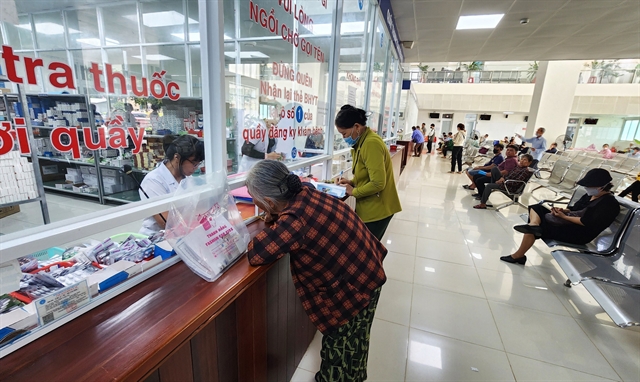 Opinion
Opinion

 |
| Minister of Health Đào Hồng Lan. VNA/VNS Photo Dương Giang |
After more than two years of the COVID-19 pandemic stretching resources of the healthcare service, 2023 might be a chance for recovery and a focus on other areas less prioritised in recent years.
Minister of Health Đào Hồng Lan speaks to the media about the challenges and solutions the healthcare sector faces in 2023.
How do you assess outstanding achievements made by the healthcare sector in 2022?
The healthcare sector made efforts in 2022 to achieve some outstanding achievements despite limited sources and capacity.
The health ministry has concretised the resolution of the National Assembly and the Government on socio-economic development in 2022 by issuing an action plan focusing on solidarity-discipline-proactive, safe and efficient adaptation, recovery and development.
The number of doctors and beds per 10,000 residents exceeded the quotas assigned by the National Assembly. There were 11.1 doctors and 31 beds per 10,000 residents. 92.03 per cent of the population is covered with health insurance.
The healthcare sector has focused on legal building with several important policies approved. They included the amended law on medical check-ups and treatment, a resolution on continuing to implement several COVID-19 prevention and control policies, and the use of certificates of free sale of drugs or drug materials, which expire from January 1, 2023, to December 31, 2024.
Other approved documents were Directive No. 17-CT/TW dated October 21, 2022, of the Party Central Committee’s Secretariat on "Strengthening food security and safety in the new situation"; Directive No. 16/CT-TTg dated September 20, 2022, issued by the Prime Minister on improving public healthcare and flexible adaptation in the post-COVID-19 period.
The country has switched to a new phase of "safe adaptation, flexibility, and effective control of the COVID-19 pandemic”. Việt Nam is among the countries with the highest rate of COVID-19 vaccine coverage in the world. Regular medical examination and treatment activities have gradually recovered after more than two years of the pandemic.
In 2022, the sector continued to develop a network of medical training institutions and complete professional competency standards and training programmes. The sector also proposed regimes and policies to attract medical workers and proposed increasing preferential allowance regimes for preventive medicine and grassroots health workers from 40-70 per cent to 100 per cent.
Administrative procedure reform and digital transformation have been promoted. Many public services of the health ministry have been provided at level 4. The ministry has shared the vaccination and anti-COVID-19 database with an administrative procedure handling system and national population database.
The sector has implemented solutions to overcome the shortage of drugs and medical equipment at healthcare examination and treatment establishments and coordinated with relevant ministries and agencies to review, propose amendments or clarify legal documents related to procurement.
The sector has also accelerated issuing, renewing, and maintaining circulation registration certificates and import permits for drugs and medical equipment.
We also proposed the Prime Minister approve a mechanism for recurrent expenditure to support public non-business units with insufficient revenue due to the COVID-19 impacts.
What are the challenges and shortcomings the health sector has to face?
Việt Nam faces many difficulties posed by the complicated situation of COVID-19, along with the appearance of new virus strains, outbreaks of dengue fever, and emerging diseases such as monkeypox and acute hepatitis of unknown cause.
The medical system with persisting shortcomings that have not been solved has directly affected public healthcare quality.
Other shortcomings come from incomplete legal document systems, limited capacity of grassroots healthcare and preventive medicine, and shortage of drugs and medical supplies at many medical facilities nationwide.
The quality of administration and patient service at medical facilities has fallen out of expectation.
The digital transformation and application of information technology have not met the requirements of the Government and the Prime Minister.
Many health workers at public health facilities, especially experienced and qualified personnel, have quit their jobs due to work pressure and occupational risks.
What breakthrough solutions have been set by the ministry to accomplish 2023 goals?
The health sector has been implementing many important solutions, including building and completing legal and institutional frameworks promptly and adequately.
The Ministry of Health will coordinate with relevant ministries and agencies to promote administrative reform and strengthen inspection to handle violations strictly.
The sector will focus on the national socio-economic recovery plan, COVID-19 prevention and control and national target programmes for 2021-25.
The ministry will strengthen the control of disease risk factors and non-communicable diseases.
The sector will focus on medical worker training for international integration; improve research capacity in medical science and technology, pharmacy and biomedicine.
In 2023, the health sector will solve the shortage of drugs and medical equipment and strengthen drug price management, ensuring enough vaccines and a stable pharmaceutical market.
As a health sector leader, could you share lessons learnt from the previous year?
One of the experiences withdrawn is to improve the roles and responsibilities of leaders of all levels, pay attention to training personnel to improve State management capacity and expertise, have timely rewards and tighten discipline.
Coordination among agencies is also important to withdraw experience and improve forecasting capacity to react to arising scenarios timely.
Another experience is to promote information and policy communication and strengthen international cooperation. VNS




